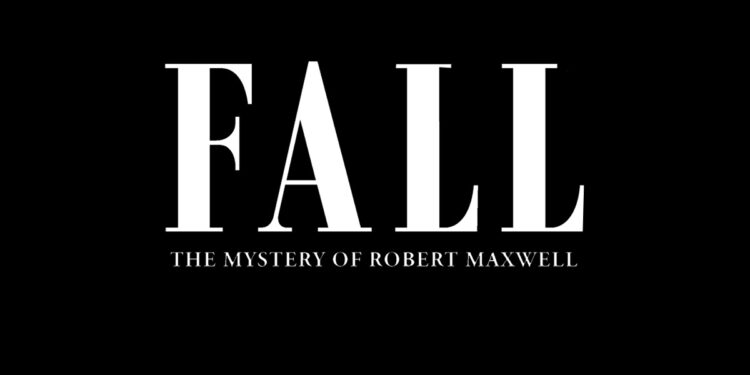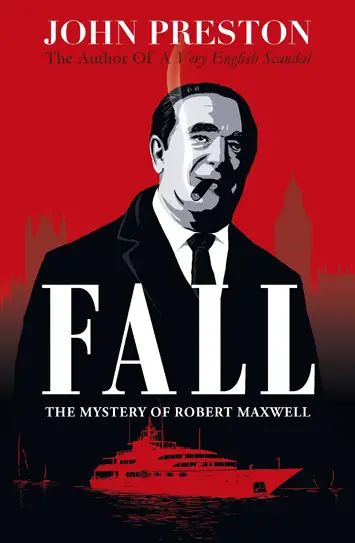Fall: The Mystery of Robert Maxwell by John Preston – Review

By Barney Bardsley
There were few public figures in twentieth century British affairs so huge and dominant as newspaper and business tycoon Robert Maxwell. It would be hard to write a biography of this outrageous character that was boring. The life itself defies belief, in its excesses, its great heights and tragic, plummeting depths. Nonetheless, John Preston has done an exceptional job here. Rarely have I read a factual account so compulsive and exciting. Even if you know – or care – nothing about Maxwell, this account will royally entertain you, and is well worth a read.
Robert Maxwell’s life ended in 1991, when he fell/jumped from his yacht, the Lady Ghislaine, in the face of financial ruin and scandal, having effectively embezzled the pension fund of the Mirror Group newspaper conglomerate that he owned, to the tune of many millions of pounds, in a desperate attempt to shore up his flailing business empire. Was his death suicide? Accident? Even murder? No one yet has successfully got to the bottom of it, but one thing is clear: the nature of his demise perfectly fitted the grotesque trajectory of his work and life. He could not have planned it better – even if he were, in the end, just a victim of his own bad luck.
Maxwell was born in 1923 into poverty, in a small town called Solotvino, in Ruthenia – later part of Czechoslovakia. He was one of a large Jewish family, that was hit by history and tragedy on a huge scale: two siblings died very young, and then both parents, two sisters, a brother and his grandfather, perished in Auschwitz at the hands of the Nazis.
From these shocking privations, Maxwell learned that survival was a matter of dog-eat-dog. He fought – and killed – in the Second World War, on the side of the Allies, and won a decoration for his bravery. And he was determined, when peace came, to become as rich and famous and powerful as possible: to move as far away from his origins as was within his means.
He went into the publishing business (after getting funds from MI6, for whom he had been an occasional spy!), and eventually bought the Daily Mirror, which he turned into his private empire. He cultivated a curious lifestyle of both pomp and vulgarity; he took risks with his money, and with everybody else’s; and for a time was wealthy and influential enough to offer to buy out the debts of post-communist Bulgaria and Russia – and not to blink an eye as he did so.
 If Maxwell the businessman was a ruthless risk taker, then his personal life was an equally megalomaniac roadway to hell, where the bodies of his family, business associates and friends, lay littered in the ditches. Betty, his wife of over forty years, was convinced that his experience of such catastrophic loss in his young life – later replicated when his son Michael died after a road accident, plunging the whole family into prolonged mourning – had warped his psyche beyond repair.
If Maxwell the businessman was a ruthless risk taker, then his personal life was an equally megalomaniac roadway to hell, where the bodies of his family, business associates and friends, lay littered in the ditches. Betty, his wife of over forty years, was convinced that his experience of such catastrophic loss in his young life – later replicated when his son Michael died after a road accident, plunging the whole family into prolonged mourning – had warped his psyche beyond repair.
“Thrilling detail”
Certainly, the brutality of his impoverished childhood, where the family had scrambled for food to survive, and where his father savagely beat his own children frequently and without remorse, had left an indelible mark. He over ate his whole life thereafter, frequently being observed at fancy buffets, cramming food into his mouth with his bare hands. His personal habits were boorish and cruel: he dominated his own children with humiliating words and vicious shouting matches; he would urinate over the balcony of his swanky London penthouse and on deck of the expensive yacht – site of his eventual downfall; and he flung platefuls of food to the floor if it wasn’t exactly to his taste, leaving his butler scrabbling at his feet to clean it up. He was so paranoid that he bugged the rooms and phones of his own staff, even the trusted insiders. He professed, despite his great status and wealth, to feeling abandoned and alone. He was, in short, a complete mess.
But, on the other hand, his charisma was like a magic charm. Betty Maxwell’s description of when she first set eyes on him, says it all: “Bob had one of those mysterious and attractive faces. A face of extraordinary mobility which captured your attention magnetically but could suddenly be transformed into a strange, steely mask, sending a chill right through you…When he spoke, his swift-moving lips, thick and red like two ripe fruits, evoked luxury and youthfulness. Yet sometimes, thin as filaments of blood, they depicted death and carnage.” It seems that Betty, like her husband, had a taste for drama and excess.
John Preston has done a masterly job with this book, meticulously researched, and with plenty of original interviews – not least with Maxwell’s son Ian – and verbatim contemporary accounts. The rivalry between the two business tycoons Rupert Murdoch and Maxwell, is outlined in thrilling detail. And the personal wounds inflicted by Maxwell’s relentless empire building are fully explored.
The child most obviously scarred by life with her father is his youngest daughter Ghislaine – his favourite – who herself now sits in prison, awaiting charges connected to another powerful and perverted male figure, her former lover, sexual predator and multiple abuser Jeffrey Epstein. It is clear where she drew the template for the man she fell in love with as a young woman.
But in the world of such a monstrous figure as Robert Maxwell, nobody came away unscathed. As Daily Mirror editor Richard Stott wrote of his boss in his memoir, “He was generous, but never kind; far-sighted but, on occasions, blind, stupid, cunningly subtle yet numbingly unpleasant… (He went) charging through people and events like a demented rhino.” It is unlikely we shall ever see Maxwell’s like again – and just as well, too.
‘Fall: The Mystery of Robert Maxwell’ by John Preston is published by Viking, £18.99 hardback









